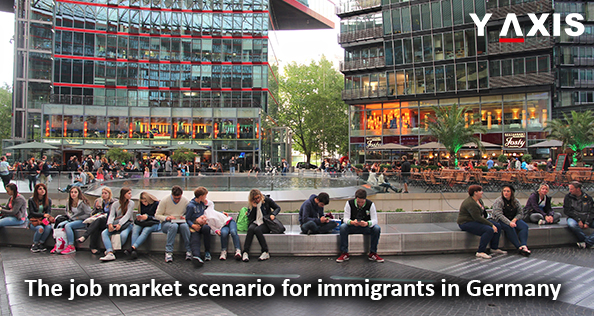Posted on April 26 2017
The job market scenario for immigrants in Germany
By , Editor
Updated March 11 2024
Overseas Immigrants who have work experience; vocational qualification or a degree and basic knowledge of the German language have good prospects of securing a job in Germany particularly in specific sectors. Being the fifth largest economy in the world and the largest in Europe, Germany has several job opportunities for overseas skilled workers and even casual jobs can also be secured with reasonable ease.
With a record low unemployment rate of 5.8 percent in March 2017, Germany has one of the lowest rates of unemployment in the European Union. In fact, certain regions of Germany such as Bavaria the rate of unemployment is very low. A report of the Federal Institution in Germany for Population research revealed that in 2010 - 11 Overseas Immigrants in Germany from outside the European Union found a job within one year, quotes Expatica.
Germany has demand for skilled professionals across diverse industries. These skilled workers include IT specialists, automotive engineers, mechanical engineers, electrical engineers, mathematicians, scientists, and doctors. Certain sectors are also in need of skilled workers possessing vocational qualifications.
As Germany is witnessing an increase in its aged population, there is also a scarcity of nurses and workers in health and geriatric professions. There is also the availability of hospitality, casual work, and English teaching jobs.
Several international firms such as Eon, Daimler, Volkswagen, Siemens, MAN, BMW, and Adidas have their presence in Germany. On the other hand, it also has the presence of medium-sized and small businesses that account for 90% of the firms in Germany and two-thirds of the job market in the nation.
Germany has just over 38 hours of average working hours per week and at least 18 holidays for every calendar year. The organization culture of Germany is hierarchical having strong management. The natives of Germany take decisions based on concrete facts and work with care on well-planned tasks.
The work culture of Germany has efficient and orderly meetings that adhere to strict schedule and agenda. The aim of discussions is to reach final decision and compliance. People in Germany are punctual and have a very well defined concept of time. In 2014, Germany adopted the minimum of 8.50 Euros per hour as the national minimum wage.
You will not need a Work Permit in Germany in case you are from Switzerland, European Economic Area, or the European Union. You must only possess an ID card or valid passport. The exception to this is Croatia that has restrictions imposed on it till 2020. The nationals from Croatia require a work permit in Germany for the first 12 months of their employment.
Nationals from the US, South Korea, New Zealand, Canada, Japan, Israel, and Australia can arrive in Germany without a visa. They can process their work and residence permit from the Alien Authority in their locality.
Nationals from any other nation require a residence permit and visa in order to be able to be employed in Germany. The ability to secure a residence permit and job in Germany is determined by the qualifications and the industry applicable to the immigrant. It might be difficult to obtain a residence permit or job in Germany in certain specific sectors.
If you are looking to Migrate, Study, Visit, Invest or Work in Germany, contact Y-Axis, the world’s most trusted Immigration & Visa Consultant.
Tags:
Germany Immigrants
Immigrants in Germany
Share
Y - Axis services
Get it on your mobile
Get News Alerts
Contact Y-Axis

